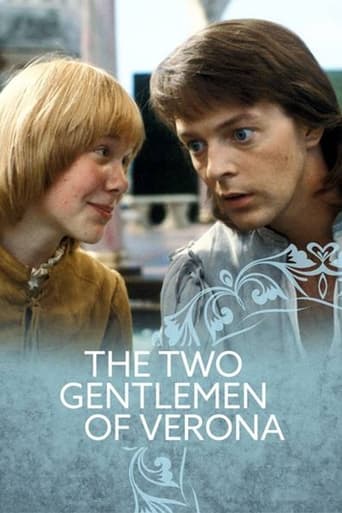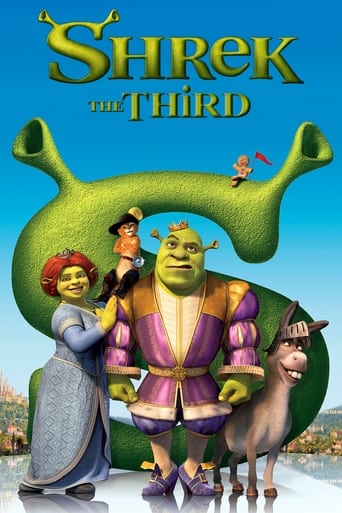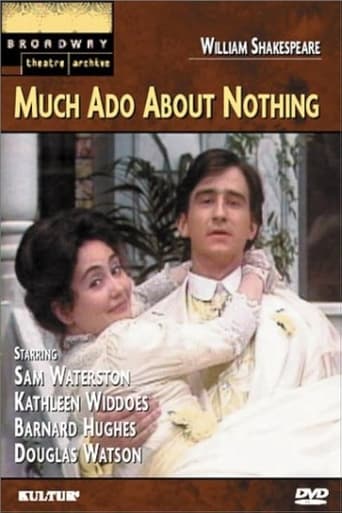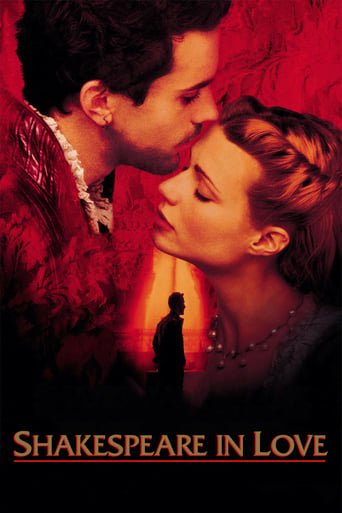The Two Gentlemen of Verona (1983)
Two great friends leave Verona for Milan, Valentine with great enthusiasm and Proteus unwillingly, as he will have to leave his recently-betrothered Julia. Valentine soon falls in love with Silvia, daughter of the Duke of Milan, but then Proteus meets the captivating Silvia... and he too becomes besotted.
Watch Trailer
Free Trial Channels
Cast


Similar titles
Reviews
Really Surprised!
Just intense enough to provide a much-needed diversion, just lightweight enough to make you forget about it soon after it’s over. It’s not exactly “good,” per se, but it does what it sets out to do in terms of putting us on edge, which makes it … successful?
Story: It's very simple but honestly that is fine.
.Like the great film, it's made with a great deal of visible affection both in front of and behind the camera.
Though most critics fall over backwards to parrot Harold Bloom's characterization of William Shakespeare's The Two Gentlemen of Verona as "the weakest of all Shakespeare's comedies," I found it to be a very entertaining effort, especially as performed by the BBC-Time-Life ensemble in its 1983 performance. Accolades should go to Joanne Pearce as Sylvia, Tessa Peake-Jones as Julia, John Hudson as Valentine, Paul Daneman as the Duke of Milan, and especially to young Nicholas Kaby as the clownish Speed. Cited among Shakespeare's works in 1598 by Francis Meres but not printed until the First Folio of 1623, the most accepted date for the work is the early 1590s but there are no documented performances. Perhaps, for stylistic reasons, it is often thought of as Shakespeare's earliest comedy.Shakespeare commentators consider the story to be taken from a Spanish play by Jorge de Montemayor, Diana Enamorada and it was performed in an anonymous English version at court by the Queen's Men in 1585 as The History of Felix and Philomena. Other influences may have been the commedia dell' arte of the Italian playwright Flaminio Scala. Although the work may not be as weak as some have said, it is generally not well thought of because of the unsavory nature of its characters, particularly the cruel betrayal of Julia by Proteus and the disturbing offer made by Valentine to Proteus in the last act.The play indeed is mystifying unless one looks at it as a fascinating look into the mind and heart of the author whose "two gentlemen" may be (as in Measure for Measure) two sides of his own personality, the trusting, open-hearted and the false-malignant. Like Measure for Measure, it is a self appraisal in which the author does not escape indictment. The story is set in Northern Italy in Verona, Milan, and Mantua and the controversy about its reference to traveling by sea from Verona to Milan and the possibility of shipwrecks has given carte blanche to all those whose goal in life is to prove how little geography Shakespeare actually knew. Although the possibility of shipwrecks does seem rather remote and Shakespeare may have written the play before he was sure of its setting, during the 16th century an extensive canal system did stretch across the Po Valley from Venice, west of Milan, and the Lombard Plain as far as Turin.While some use this play to denigrate Shakespeare, others make the case that the writer showed an astoundingly detailed and accurate knowledge of Italy, demonstrating extensive familiarity with Milanese landmarks such as the Abbey of Saint Ambrose, the Well of St. Gregory, and the Lazaretto. Whether the author visited Italy or not, he makes the audience feel as if everything is coming from rich personal experience. Two Gentlemen is the tale of two friends living in Verona, Valentine and Proteus, whose interests in women lead to complications, none of which are handled very well. Both interestingly enough are known as writers and, when Valentine's lover Sylvia (daughter of a powerful duke) asks him to write poems for her, he discovers that he is writing not for his lover's contentment but for his own satisfaction.Both Valentine and Proteus are sent to Milan, Valentine to gain worldly experience as he asserts, "Home-keeping youth have ever homely wits", and Proteus on a mission from his father. When Proteus arrives, he discovers that Valentine has fallen in love with Sylvia. Turning his back on Julia to whom he had offered undying devotion, he begins to court Sylvia, even while knowing that she loves Valentine and, has been pledged to Thurio by her father. Treachery, plotting, and cruelty abound throughout the play and in the final scene, as Proteus threatens Sylvia who is betrothed to Valentine woo you like a soldier, at arms' And love you 'gainst the nature of love – force ye.As Valentine rushes in to save his lady, Proteus puts his sins behind him:O heaven, were man But constant, he were perfect! That one error Fills him with faults, makes him run through all th' sins.To which Valentine responds incongruously:Then I am paid; And once again do I receive thee honest. And, that my love may appear plain and free, All that was mine in Silvia I give thee.It is an offer that, under the circumstances of a threatened assault, is unfathomable if addressed to another person, but conceivable if addressed to oneself and inaudible to their object. As in Measure for Measure, however, all dishonor is forgiven and the perpetrator, after exposing his faults for all the world to see, is let off the hook with a large measure of unearned compassion. If these events are not the substance of the dramatist's life, they make no sense whatsoever. To paraphrase author Elisabeth Sears, it is clear that in dealing in his plays with the themes that tormented him in real life as a means of exorcising his troubles, Shakespeare was able to transform his anguish into artistic creativity of the highest order.
My rating isn't for the story for which I'd give only 6 but for the gorgeous settings and good acting - how the actor could act stupid, selfish Proteus so well is worth watching by itself! I've been rewatching this wonderful series - and watching for the first time some I missed when they were shown on TV originally. The story is good enough to enjoy tho' not one of the Bard's best by any means. I really couldn't though agree with one reviewer who suggested the lines by the lovers (and therefore I suppose the whole play) should have been played for laughs because I love the language and the style and I really don't want to see any of the plays presented as complete farce. Added to which I don't find the others in the play farcical nor the story itself. The problem lies in Proteus being so intolerable immature, stupid and selfish. But I can imagine the viewer in question becoming frustrated at Proteus' persistent stupidity and wondering if farce might have helped any viewer to calm down rather than want every few minutes to give him a slap for his bad behaviour. Certainly he doesn't suffer enough at the end when he's forgiven, and that means the viewer doesn't feel much pleasure at his redemption. He doesn't seem to deserve it, nor Julia who's suffered quite enough from his ill behaviour. I wonder what her father and mother will think of all this and especially of Proteus, when she finally goes home with her regained lover? But doubtless the Duke will deal with the parents tactfully?Thank goodness Sylvia has the sense not to listen to nasty Proteus but to realise immediately that he betrayed the trust of his friend and her love. One can accept Proteus can't help his lusts and when forcibly parted from Julia, this very silly young man immediately swoons over another lovely girl who's nearby instead of afar. The worst moment is when he declares all's fair in love but in terms that are thoroughly insulting to Valentine, Julia and Sylvia too. Valentine banished behaves sensibly and shows he's worthy of Sylvia, hence the Duke forgives him for his attempt to make off with her secretly seeing that was to save her from the unwanted husband the Duke is trying to force on her. Deceitful Proteus though is far too easily forgiven by Julia even though he has hurt her over and over as she, disguised as a page, has to listen to his passionate declarations to Sylvia and dismissal of his past love. A slap across his face (or several during the play) would have done him a world of good. I suppose he's forgiven because humans can't control love - it strikes where it will as Cupid in this production demonstrates now and again. These days people expect a bit more contrition, I think. Still, the actor does his best with his moment of self-discovery and shame.So, a very satisfying production visually which makes up a great deal for Proteus being such a completely stupid and deceitful twerp and a certain lack of satisfaction at the end. Well worth watching.
The Two Gentlemen of Verona is one of Shakespeare's first plays (maybe THE first), and it is rarely seen staged, much less filmed. So this BBC production is a treat and a gem to anyone who strives to familiarize themselves with all of Shakespeare, such as myself.And I must say the production enthused me thoroughly! The set is beautiful, and I am in prostrate awe of these amazing British actors, who can say the most incredible lines, as if these words had no other proper places than on the tongues of these very trophies of the thespian muse. Some scenes were very emotional, and the actors never did flinch an inch, but performed to perfection!The page, Speed, was the best cast member (I wonder how old he was at the time), and I will also single out both Julia and Valentine for da capo performances. Proteus was perhaps a bit oafish, and a bit gay, but he, too, was up to the task and did not disparage the whole. I thought Silvia had a few slightly boring scenes, but 'tis no great matter. The "bit with the dog" (as it is called in Shakespeare In Love), however, didn't contribute a terrible lot to the story, I thought. Launce was a minor character, only thrown in to please the bawdry-craving crowd, but it's possible he would have appealed to me more, had he been presented as more integral to the action - and as rather funnier than he was here.The way the language was spoken and enacted was very lofty. Rather too lofty for a comedy, perhaps. But the good people at BBC knew what they were doing: they were paying homage to Shakespeare's words, and as such felt obliged to focus more on the words than on the theatrics. A more frivolous staging might have been seen by others as less serious and timeless, and might forsooth have been so, if the comedy were not done very well indeed.And as for the story; yes, well, we all agree that it is not Shakespeare's best. Nor his second or third best, and so on. However, is it not a preliminary study to the rest of his works!? Two Gentlemen of Verona practically overflows with thematic references to a dozen or more of the later plays! To wit: We have four lovers running afoul of each other as in A Midsummer Night's Dream. We have a woman disguised as a man, as in several later plays (well, it was a common Elizabethan theme, and would have helped the boy actors to play female parts without having to act like women all the time). We have a band of forest outlaws, almost as the Arden Forest refugees in As You Like It. We have a Friar Laurence like in Romeo and Juliet, and Julia herself is surely an early version of Juliet. We have references to Milan, Mantua and Verona, all of which recur in later plays. I dare suggest that The Two Gentlemen of Verona is not so much a play as a list of ideas for Shakespeare's subsequent comedies, possibly even written down for the express purpose of serving as cues via the which he would remember what to put into his more mature plays years later. Shakespeare was no fluke; he knew what he was doing.To address the pivotal final scene with Proteus' repentance and Valentine's forgiveness; well, Proteus' lines do seem a bit brief to warrant such instant and total forgiveness, but I think the justification for this development should be expressed in the performance, by pausing the words to let the emotion in Proteus' face speak up. Or by arranging the situation and the scenes so that it becomes more clear that Proteus' regret is utterly genuine. This production did not pull this off in a convincing way, but I'm certain it can be done. It may be difficult, but I think it must be possible.But, overall, a GREAT production! What luck that we have the BBC to bestow upon us mere mortals such absolutely impeccably and consummately professionally realized masterworks. My humble thanks.9 out of 10.
If "Two Gentlemen" isn't the first of Shakespeare's plays, it might as well be. There are many themes here that are rough sketches for later, more fully developed works, but the play as a whole is a misfire, and this performance can't redeem it.The physical production is beautiful, and Crab, the dog, is an unfailing source of warmth and enjoyment. The human actors, however, are much more of a mixed lot, with none outstanding, some good, a handful perplexing and more than a few excruciating.A wise man once said, "Never tell an English actor he's in a comedy," and the first, sunny half of the play is a chore to sit through with all the mugging, rolling eyeballs and forced laughter. Once things get serious at about the midpoint the young cast is on a firmer emotional footing, however preposterous the plot. Shockingly, the final Shakespearean resolution, in which everybody forgives everybody and all the couples are united, for once does not produce the requisite spinal tingle.You may remember the beautiful sets. You will remember the dog. But you won't have that wonderful feeling of two or three hours in the exquisite company of Shakespeare, because this one just doesn't work.












